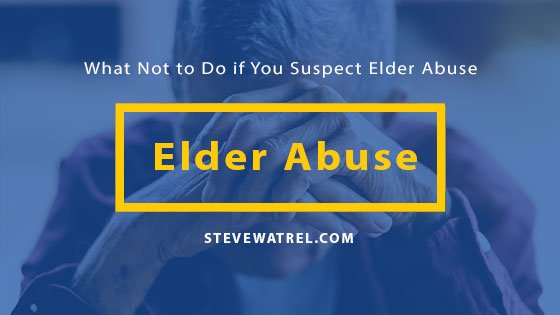When elderly individuals can no longer care for themselves, there is typically a network of people who collaborate to ensure they receive the care and attention they need. If the individual lives in their own home, this may include family members, professional home care providers, and nurses. Others may reside in a nursing home will rely on employees, nurses, and doctors. When there are so may people involved with the care process, it’s crucial to know the signs that elder abuse is going on.
Unfortunately, medical professionals and caregivers working with older individuals may not be aware of the signs of elder abuse because they aren’t properly trained. Also, the person who is being abused may not report it.
Before discussing what not to do if you suspect elder abuse, you need to know some of the signs that indicate this is going on.
Signs of Elder Abuse
Some of the most common signs elder abuse is occurring include:
- Poor hygiene
- Unusual or unexplained weight loss
- Frequent arguments
- Caregivers not allowing anyone to see the older person without them present
- Sudden changes in the older person’s financial situation
- Unexplained bruises an injuries
- Strange behaviors such as mumbling, sucking, or rocking
- Drug overdose or not taking medication properly
- Withdrawal from normal activities
If you notice any of these signs, there are certain things you need to do, but there are also several things you should not do. Keep reading to learn what not to do if you suspect elder abuse.
Don’t Ignore the Signs of a Problem
You may second-guess what you have seen and begin to think it isn’t as big of a deal as you made it out to be. This can result in you convincing yourself not to do anything. In fact, you may begin ignoring the signs of abuse, chalking it up to being paranoid.
This is a huge, yet common, mistake. You should never ignore the signs of elder abuse. Also, remember that each case is unique. Just because a behavior or issue isn’t on the list above, it doesn’t mean that abuse isn’t going on. If you suspect something, you have the responsibility to take action.
Don’t Wait to Call the Authorities
While you may take action by removing the individual being abused from the situation, there is something else you should do, as well. It is crucial that you report the abuse to the local authorities. If your family member or someone you know is being abused, the person abusing them needs to be held responsible for this. In addition to reporting the abuse, it is smart to hire an attorney to represent your situation and case and to help ensure that justice is served.
Unfortunately, the prevalence of elder abuse around the nation is growing. If this is something you suspect, don’t wait to take action. You have the responsibility to help those who are unable to help themselves and by reporting the situation, you can do this.




